
In order to fully comprehend the irony adopted by New Englanders, its important to understand the weather has been attempting to play us for chumps, with many signs of an early spring. A couple February storms had given us a quick three feet of powder snow, but then mild breezes swept north and the snow vanished with amazing speed. Signs of an early spring were everywhere. The pussy willows budded (wearing warm coats, which shows you they, at least, are not fooled by the weather).

Mosses greened on the forest floor:
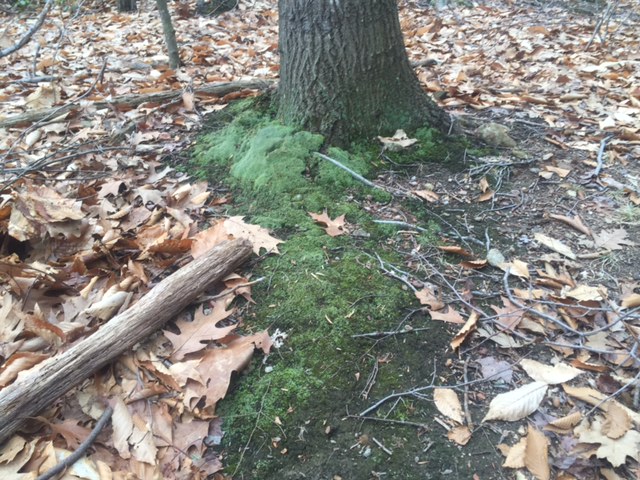
And, of course, we had a hard time keeping coats on the kids, at our Childcare. Even when they sort of kept them on, they seemed to think they served better as sails in the warm gales from the south.

The sap was running so fast in the maples the sugar-makers furrowed their brows with worry that it would be a bad year, with the run of sap over-and-done in a flash, and I was amazed by how quickly the ice vanished from ponds.

Usually in late February we are still tromping across the ice, and it is March first when I start to be very careful, because strong spring sunshine has a way of thinning ice even when it is below freezing. (I think the ice may be like the roof of a greenhouse, and warms the water just beneath.) This year I didn’t worry about that, and instead had to keep an eye out for kids falling in at the edge. There is something irresistible about water, to children in the spring.
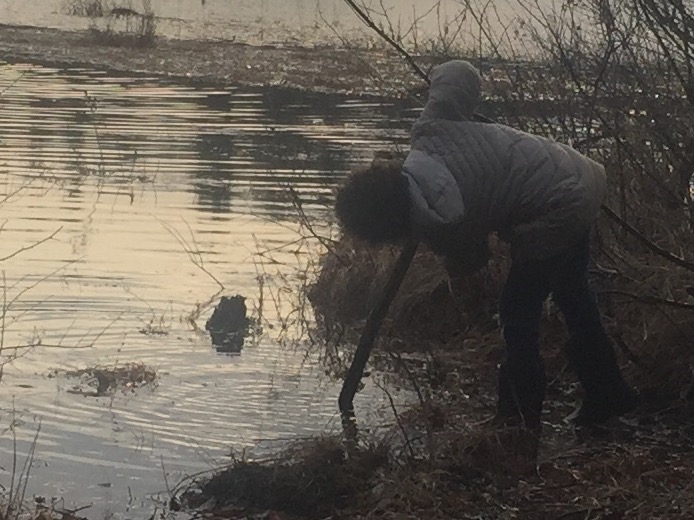
And even if they don’t fall in, children can find ways to get very wet.
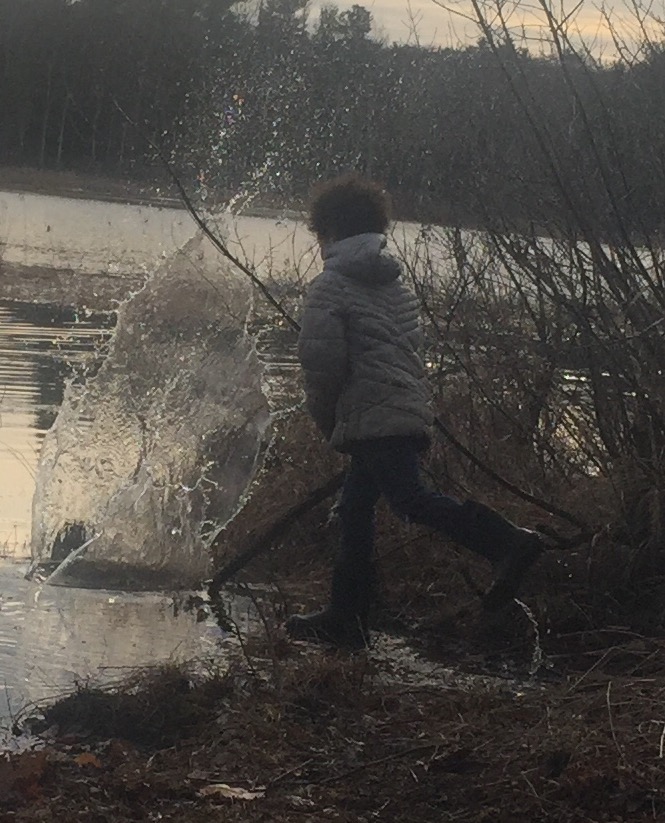
But this was February, and old, cantankerous anachronisms like myself are not fooled. We know March comes in like a lion.
The cold front that came was fascinating to me, for it was very dry on both sides of the front, so there was no line of showers or thunderstorms. However I did notice the sky, which had been perfectly blue, suddenly had a few small cumulus to the north, coming south fairly rapidly. I was herding a small gang of 6-9 year-olds out to the bus stop, and the sky was so fascinating I was unimpressed by a drama occurring between a boy and girl right in front of me.
The “official rules” state one cannot “save” their place in line with a backpack, but one girl was seeing if she could break the rules, and the boy objected. Rather than seeking me (as I am judge and jury) he booted her backpack about fifteen yards away, which breaks another “official rule.” The girl then flopped on the ground and sobbed, achieving a level of decibels that might make a jet airplane cower. The boy folded his arms and sneered at her. Rather than giving the children any attention, I pointed at the sky and exclaimed, “Will you look at that!”
The other seven children were shrugging and rolling their eyes, for the drama was everyday. Perhaps that is why I was giving it so little attention. No matter how much I arbitrate, that boy and that girl always seem to enact the same drama. However the young girl was having none of it. She was bound to get my attention by hook or by crook, and was working herself up into a hysteria, as the boy just tugged the brim of his baseball cap down over his eyebrows and looked all the more ruthless. I pointed off at the horizon. “Look! Entire trees are swaying. Big wind is coming!”
I have a reputation for attempting to deal with some petty squabbles with distractions. (I basically change the subject.) Perhaps this explains why absolutely no one payed any attention, as a roaring noise approached. The thaw had uncovered the unraked leaves in the pasture…

And suddenly the leaves stirred and then swirled up like a vast dust devil and came charging towards us. “Here it comes!” I shouted, and then we were hit by a blast of wind I would guess was around 70 miles an hour. The seven children who were onlookers all screamed for the sheer joy of screaming, the hysterical girl became owl-eyed and silent for roughly a second, before starting anew, and the tough boy burst into tears, for his favorite baseball cap took off for Europe. Meanwhile a mother was just arriving with her five-year-old, and looked around at all the screaming and sobbing midst swirling leaves with deep concern, as her child looked about with a sleepy expression, and then smiled in approval. I just shrugged and said, “Don’t worry. It goes with the territory”, and then went to retrieve the boy’s hat from across the street, as the bus came lumbering down the road. Roughly fifty seconds later the wind was dying down, and the noise was the bus driver’s problem, and peace returned. However I could feel the difference in the air. By afternoon flurries were dusting the landscape, and the mud I had told the children to stay out of was becoming hard as iron.
March had definitely come in like a lion. The expression that is used in many lands, “If you don’t like the weather wait a minute” is said to have originated in New England (when Mark Twain lived here) but everyone else says it originated in their neighborhood. I don’t want to start any fights, so I’ll just quote what Mark Twain actually wrote:
“I reverently believe that the Maker who made us all makes everything in New England but the weather. I don’t know who makes that, but I think it must be raw apprentices in the weather-clerk’s factory who experiment and learn how, in New England, for board and clothes, and then are promoted to make weather for countries that require a good article, and will take their custom elsewhere if they don’t get it.
There is a sumptuous variety about the New England weather that compels the stranger’s admiration — and regret. The weather is always doing something there; always attending strictly to business; always getting up new designs and trying them on the people to see how they will go. But it gets through more business in spring than in any other season.
In the spring I have counted one hundred and thirty-six different kinds of weather inside of four-and-twenty hours. It was I that made the fame and fortune of that man that had that marvelous collection of weather on exhibition at the Centennial, that so astounded the foreigners. He was going to travel all over the world and get specimens from all the climes. I said, “Don’t you do it; you come to New England on a favorable spring day.” I told him what we could do in the way of style, variety, and quantity. Well, he came and he made his collection in four days. As to variety, why, he confessed that he got hundreds of kinds of weather that he had never heard of before. And as to quantity — well, after he had picked out and discarded all that was blemished in any way, he not only had weather enough, but weather to spare; weather to hire out; weather to sell; to deposit; weather to invest; weather to give to the poor.”
As an old grouch I began warning people to keep their guard up as soon as this winter had a nice spell in January. Then I looked very smug when we got three feet of snow in early February. Then, when that melted, I pouted only a little while, before I remembered the winter of 1887-1888 was remarkably mild and snowless, before THE blizzard of 1888 struck on March 11, and lasted until the 14th. New York City got four feet.
A Buried City: The Blizzard of 1888

It is always good to have some history, if you want to be a pessimistic old grouch, and spoil another’s good day. However it is quite another thing to actually predict when such a storm will happen. Here I must be humble and state I bow before the ability of some meteorologists, especially Joe Bastardi and Joe D’Aleo, who gave me a heads-up over a week ago on their Weatherbell Site, when the computer models were still waffling with a wide variety of possible solutions.
I know just enough about meteorology to know how many things can go wrong with a forecast for a storm. I have suffered considerable agony over such forecasts, for when I was young a storm was a gift from heaven, freeing me from the purgatory of school and allowing the sheer paradise of play. My opinion of the white stuff has considerably altered since then, but I still recall the shamefaced TV weathermen explaining why certain storms of my boyhood failed to manifest. They could veer out to sea, or they could “elongate” and become two or three weak storms rather becoming a single gale, or, worst of all, they could hook inland and turn the snow to pouring rain.
A lot of things have to happen right, but when they happen they can happen fast. I recall reading a description of the blizzard of 1888 from the perspective of fishermen, (I can’t offer a link, because I have never found that article again), and apparently even the sailors were fooled. The sail-powered Long Island fleet was trying to sneak a trip in, on a balmy spring day, and suddenly the sky swiftly grew black and they heard thunder, and it was a battle to get back to shore, and not every boat made it.
This abrupt development of a storm (not a lone thunderstorm but a gale many hundreds of miles across) is dubbed “bombogenesis” by meteorologists, and while the word has not yet been accepted by Webster’s Dictionary, it does express the explosive nature of the development. Joseph D’Aleo is an expert on how it occurs, and to simplify his excellent explanations, (found on his Weatherbell site), what occurs is that a “lid” which has been holding ocean-warmed air down, and keeping it from rising, is abruptly removed as a high pressure’s descending air moves away. Then the uplift is further enhanced by one or two jet-streams.
One fascinating thing about jet streams is that they don’t merely move in a straight line, but corkscrew in a clockwise manner at the front and a counter-clockwise manner to the rear (facing forward.) Therefore if the back of a departing jet lines up correctly with the front of an arriving jet, the uplift can be extreme, and storms go from having a lid on them to having every encouragement to explode upwards.

What amazes me is the ability some meteorologists have to see when this “might” occur, days in advance. I think meteorologists deserve far more credit than they get, for giving us fair warning. Everyone is eager to make them a laughing stock when they are wrong, but they sometimes are right, and when they are right they deserve thanks, because, to be honest, I doubt we’d have a clue these storms were coming without them.
I like to test myself. I spend a lot of time outside, and like to see if I can tell when a storm is coming, by only using what I can gauge with my own eyes. I saw very little that clued me in this past week. Not even my goats seemed to be wary. Yesterday morning there was a weak low down in the Gulf of Mexico, and a small storm rolling across the Great Pains, and a “lid” of high pressure off the east coast.
The radar showed some snow over the midwest, but no sign of a bomb to the east and only a few sprinkles of rain in the Gulf.
We’d been experiencing bitter cold: -2° on Sunday morning and 3° on Monday morning (-19° and -16° Celsius) with Sunday’s bitter winds giving way to Monday’s calm. Rather than falling the pressure kept rising, to 30.17 at noon on Monday. High clouds made the skies gray around noon on Monday, but then it cleared off. I joked it was a gorgeous day, and people were foolish to be rushing about, but they continued. The stores were crowded with people stocking up, though there was no sign of a storm. In fact it was the dull sort of day worthy of one E.B.Webster’s “Life’s Darkest Moments” cartoons.

I was able to salvage some of the afternoon by allowing the older boys (8 years old) to start a fire on their own, and then showing them tricks to success when they failed.
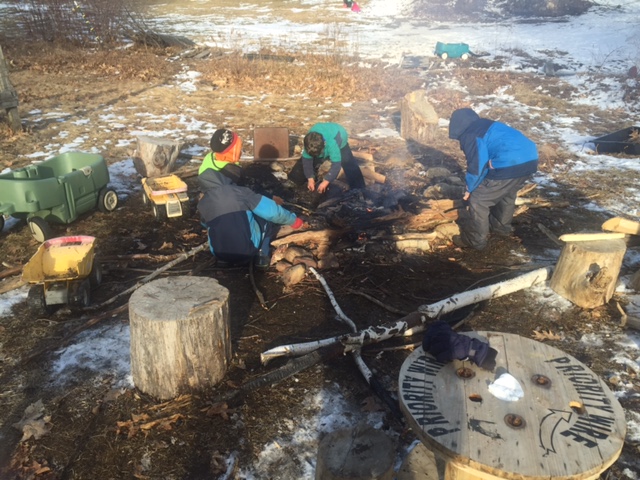
However the future still looked dull, though word came school had been cancelled at the public schools, the following day. (Our childcare has never been closed.) Then the evening map showed some signs the northern and southern lows were “phasing”

And the radar showed the “lid” was coming off at the coast, but it looked like mostly rain.

Still, the moon was bright, and the barometer was high, only slightly falling, 30.15 at 7:45 PM and 30.11 at midnight.
Then, this morning, the storm had appeared on the coast, with the barometer starting to fall more swiftly to 29.98, and light snow falling outside.

The rain had changed to snow as it pushed north, and after bottoming out at 17° my thermometer was refusing to rise. It looks like bombogenesis for certain.

Update. Only one boy showed up at the Childcare. Everyone is hunkering down, as the forecast is ominous for the afternoon, with gusts to 60 mph and perhaps some freezing rain briefly mixing in to break branches and perhaps knock out our power, in which case I guess I won’t update, (Ha ha).
Barometer is falling rapidly to 29.65, and temperature has nudged up to 19°. (-7° Celsius)

Snow is moderate. We have 4 inches. The real heavy stuff is not far to our south.

Update: 1:41 PM Heavy snow and windy. — 23° — 29.38 and falling rapidly.
Update 3:30 PM Heavy snow and windy — 23° — 29.16 and falling rapidly. Snow may slack off as dry slot pushes north from south of us.

Update: 4:08 —24° — 29.06 Windy but snow slacking off. Now it is fine, sifting flakes penetrating chinks of clothing on a strong wind. No way am I heading out to clean-up quite yet, but I can take a picture out my front window.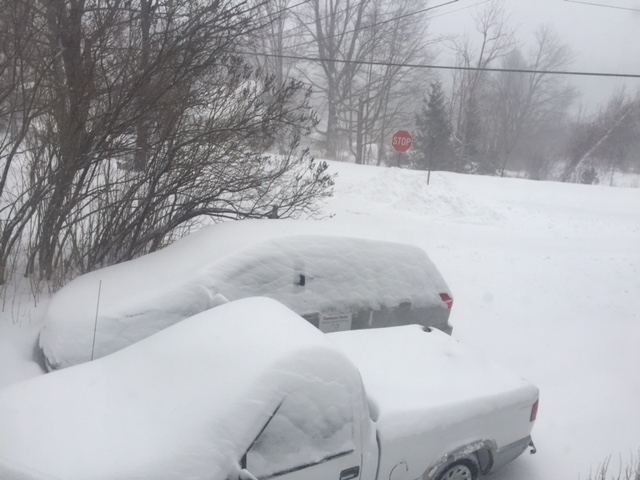
5:00 –24°– –28.98 — No snow shows over us on radar, but the fine stuff is still falling. The wind is going to make clean-up problematic, as places will drift back in. In fact, by raising walls of snow either side of a walkway I may merely make a deeper place to drift in. Therefore perhaps its wiser to stay indoors?
6:07 PM –24°– –28.86– Dry slot over us on radar but steady light snow falling


9:50 PM Clean-up done at childcare. Snow was not light and fluffy. It was starchy and fairly heavy. Hard to gauge depth, due to drifting. I’d guess 16 inches. Wind slacked off, with occasional big gusts. Snow was fine and didn’t show on radar, but in the past half hour big flakes began falling, and abruptly appeared on the radar. Barometer 28.88 and steady. Temperature 23° (-5° Celsius) .


Update: 1:00 AM –18°– –28.99–Still some light snow
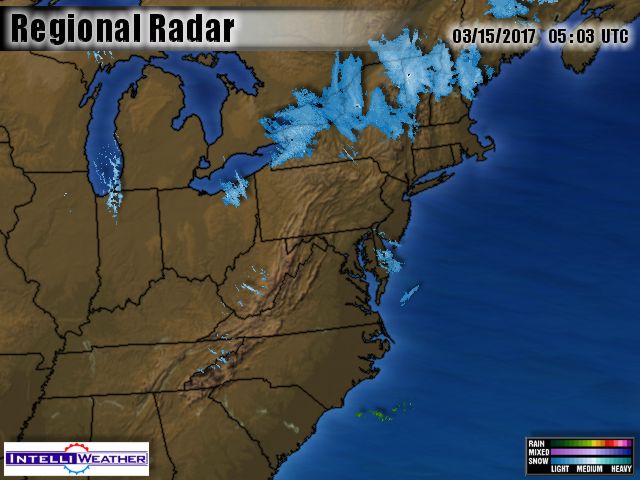
7:00 AM 9° — 29.13 — Blue skies we had about another inch, but lots of drifting.
POST-STORM UPDATE
11:00 AM Sunny 19°; Barometer 29.15 and steady. Winds surprisingly light, considering how tight the isobars look on the map. Backlash snows well to our west over New York State.


I had to do more clean-up due to drifting, and also due to the fact State Law wants all exits clear. (I think it is so Child Care Professionals can escape the building when the kids are about to drive them bonkers, but I could be wrong about that.) There was a two-hour-delay, so the older children got to stay with us longer before the bus came. I tried to look appropriately sad about leaving the din to go out into the gorgeous sunshine, but my frown was upside down.
The snow was stiff and starchy and the snowblower has only five blades working because a rock broke a sheer-pin on the sixth, so the blower crept through the deep snow with exasperating slowness. I’d say it moved at around a yard a minute.

There were some emergencies that couldn’t wait for a path to be cleared. There was no heat in the childcare, and I assumed the air-inlet was blocked by snow, and that I needed to trudge through the drifts. (Inlet just beyond blocked exit).

I was able to clean the inlet with my pinkie finger, and saved the day. This is the fourth time I’ve been a hero with a minimum of effort. Ice was starting to skim the upstairs toilet, but I realized the upstairs heat had been accidentally turned off, so I fixed that problem by turning on the heat. Then the water pressure was low, and I became aware a pipe had frozen and burst because a window had blown out in the basement of the old farmhouse, which seemed major, but I fixed the window by picking it up from the floor (it had six panes and not one broke), and jamming it back where it belonged, and then the broken pipe turned out to be a side-line leading to an outdoor spigot, so I simply turned a faucet handle and shut off that line (to be fixed when the weather was warmer), and just like that I’m a hero again.

Then I could get back to clearing the exits. Unfortunately the blower only clears snow two feet deep, which is only enough for a dog door in some exits.

I was thinking of telling my wife that in an emergency people could crawl, but after further consideration I broke down and used an old fashioned shovel. I’m still alive.
Now all eyes are looking to the Canadian prairies. An Alberta Clipper is expected to slide down from there over the next few days, and again there may be bombogenesis on the coast. Never a dull moment.
From Joe Bastardi’s blog at Weatherbell, here is how one model sees the snow this weekend. (Cape Cod gets hammered, and we only get an inch….fine with me.)

2:30 PM 29.22 and steady. 21°, and partly cloudy; some high clouds of the “junk” variety, but mostly low cumulus looking suspicious, like we might get some flurries.
10:00 PM –29.41– –14°–Scattered flurries
Thursday, 7:00 AM –29.55– –13°– Partly cloudy (Overnight low 10°)

















































